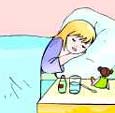The Kissing Disease? – Not Really!
What is Mononucleosis?
 Mononucleosis, sometimes called “mono” is caused by the Epstein-Barr virus, a member of the herpes family. Even though this virus is one of several herpes viruses, it has nothing to do with cold sores or genital herpes. (Although it may trigger an outbreak of either if you have those). It’s classified as a herpes virus because once you’ve been infected, the virus stays in your body the rest of your life and may reappear in your saliva from time to time. However, you probably won’t get the symptoms of mono again from this virus.
Mononucleosis, sometimes called “mono” is caused by the Epstein-Barr virus, a member of the herpes family. Even though this virus is one of several herpes viruses, it has nothing to do with cold sores or genital herpes. (Although it may trigger an outbreak of either if you have those). It’s classified as a herpes virus because once you’ve been infected, the virus stays in your body the rest of your life and may reappear in your saliva from time to time. However, you probably won’t get the symptoms of mono again from this virus.
Mononucleosis is a respiratory virus that affects the blood cells and the salivary glands (the glands responsible for producing saliva). Even though anyone can get mononucleosis, most people who get the illness are between the ages of 15 and 25. Mono can keep you out of commission for weeks or even months.
How Do People Get Mono?
You can get mononucleosis through direct contact with infected saliva – sharing a straw or an eating utensil can expose you to the virus. Another common way to catch mono is by kissing someone who’s infected (which is how the illness got its nickname as the “kissing disease”).
 Although a quick smooch between friends probably won’t do any harm, intimate kissing with someone who’s infected or who has recently had mononucleosis can put you at greater risk for getting the disease. The virus can be transmitted in other ways, such drinking from the same glass or can as an infected person, or even being close when the person coughs or sneezes. Also, some people can have the virus in their systems without ever having symptoms and so you can still catch it from them.
Although a quick smooch between friends probably won’t do any harm, intimate kissing with someone who’s infected or who has recently had mononucleosis can put you at greater risk for getting the disease. The virus can be transmitted in other ways, such drinking from the same glass or can as an infected person, or even being close when the person coughs or sneezes. Also, some people can have the virus in their systems without ever having symptoms and so you can still catch it from them.
Symptoms:
The virus has a long incubation period and sometimes symptoms wont occur until up to 30 to 60 days. Most often symptoms begin to appear 2 weeks to 60 days after you’ve been infected. The most common symptom is being tired all the time. As another one of its nicknames, ‘glandular fever’ implies, perhaps the most distinguishing mono symptom is enlarged glands or lymph nodes, especially in the neck, but also in the armpit and groin. Other signs include:
- fever, often high, sometimes up to 103° F or 39.5° C
- very sore throat
- swollen lymph glands (the glands located in your neck, underarms, and groin)
- headaches
- muscles that ache
- larger-than-normal liver and spleen – (your health care provider will be able to ‘feel’ your liver and spleen area easier than you can).
Even if you have several symptoms, don’t try to diagnose yourself. Always consult your health care provider if you have a fever, sore throat, and swollen glands, or are unusually tired for no apparent reason. Because there are so many different symptoms, the doctor may mistake the illness for the flu or even strep throat. In fact, some teens have mono and strep throat at the same time. The only way to tell if you do have mono is through a blood test. Even if you test positive (which means you have it), there isn’t much the doctor can do. Your health care provider will also do some other blood tests to check your blood count and liver function.
 There is no cure for mononucleosis. Antibiotics such as penicillin won’t help unless you have a secondary infection like strep throat.
There is no cure for mononucleosis. Antibiotics such as penicillin won’t help unless you have a secondary infection like strep throat.
In fact, Ampicillin and Amoxicillin should be avoided since up to 90% of patients with “mono” develop a pink skin rash while taking these medications with mono. The good news about mono is that even if you do nothing, the illness will go away by itself, usually in 1 to 3 weeks, but it is better to rest when you have mono and to avoid secondary infection by another illness!
How Can I Get Better?
 Rest, rest, rest!
Rest, rest, rest!
Although there’s no magic pill that can make mono go away, there are some things you can do to feel better. The best treatment is to get plenty of rest, especially during the beginning stages of the illness when your symptoms are the worst and drink plenty of water and fluids. (This is for uncomplicated mono, where the spleen or liver is not involved).
Put yourself to bed and forget school, sports, and that party you wanted to go to. Take acetaminophen (Tylenol) or ibuprofen (Advil, Motrin, or Nuprin) for the fever and aching muscles. (Steer clear of aspirin unless your doctor tells you to take it – it’s been linked to a serious disease in people under 16 called Reye’s syndrome, which can lead to death.) If you have a sore throat, gargle with plenty of warm salt water, or suck on hard candy or popsicles. Even if you’re not hungry, try to eat a well-balanced diet. Drink lots and lots of water.
When you start feeling better – usually within 2 weeks or so take it slowly. Some people don’t feel better until about 4 weeks later. (I had a bad case at age 17). Although you can return to school once your fever disappears, you may still feel tired. Your body will tell you when it’s time to rest, so listen to it. Keep things low-key and try taking afternoon naps.
Most health care providers recommends avoiding sports for at least a month after the symptoms disappear, especially if your spleen is enlarged. An enlarged spleen can rupture easily, causing severe abdominal pain and requiring emergency surgery, so don’t participate in contact sports, cheerleading, or even wrestling with your friends until your health care provider gives you permission.
And, speaking of your spleen if you become constipated while you’re sick, relax! Straining when you go to the bathroom can also injure an enlarged spleen. To help things return to normal, increase the amount of fruits, vegetables, and whole grains in your diet and drink plenty of water too.
Remember, an enlarged spleen, called: splenomegaly, may lead to rupture) or an enlarged liver (hepatomegaly) is very serious. Your doctor should check to see if you have either.

Because mono can stay active in your body for up to a year after the symptoms disappear, make sure you don’t share the illness with your friends and family.
Keep your drinks and eating utensils to yourself, cover your nose and mouth when you sneeze or cough, and wash your hands often. If you share a phone with the rest of the household, wipe the mouthpiece with rubbing alcohol after you’ve used it. This is one time when your friends and family will thank you for being selfish.
Learn more about other Infectious Diseases… Also, check out STDs, Mono, is NOT considered one, BTW! Also see what benefits kissing does have that some researchers have found.
* Update: April 2003 – Epstein-Barr Virus shown to increase the risk of MS (Multiple Sclerosis), for more…
